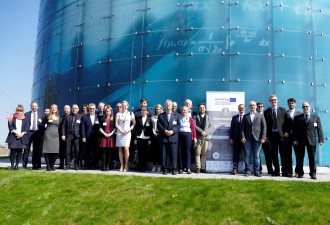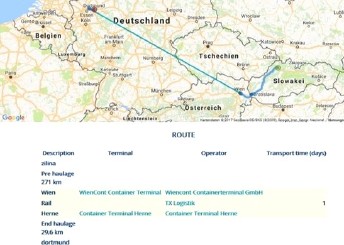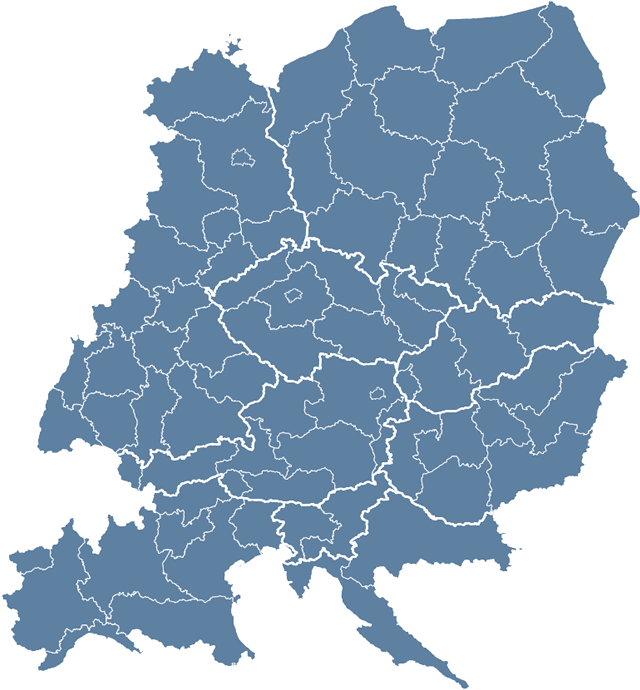ChemMultimodal
The chemical industry is an important economic sector in central Europe with 117 billion Euro turnover and 340.000 employees. Chemical companies are important logistic stakeholders responsible for 8 percent of freight transport. The main objective of ChemMultimodal is the promotion of multimodal transport of chemical goods. The project achieved this by coordinating and facilitating cooperation between chemical companies, specialised logistics service providers (LSP), terminal operators and public authorities in chemical regions in central Europe.
Based on a detailed analysis of the needs for improving multimodal transport of chemical goods, the project developed a toolbox to support chemical
companies and logistics service providers in their strategic and operational planning for increasing the share of multimodal transport. This toolbox has been tested in 7 pilots with 58 chemical companies in the partner countries to facilitate real modal shift. In these pilots it was the objective to increase multimodal transport by 10 percent and reduce CO2 footprint by 5 percent until the end of project duration. Based on lessons learnt from the pilot phase 1 common strategy and 7 regional action plans have been developed to continue and intensify activities after the project end.
09.07.2019
News
ChemMultimodal Project Came to a Successful End
09.04.2019
News
Conference on Multimodal Transports in the Chemical Industry in Central Europe

- Outputs
The partners conducted an analysis of multimodal transport to identify the potential for modal shift. Based on this detailed analysis a toolbox was developed to support chemical companies and logistics service providers to practically implement modal shift of chemical goods. The developed toolbox was tested throughout the partner regions and countries in 7 pilot projects with 58 chemical companies in the partner countries to facilitate real modal shift. The aim of these pilot projects was to increase multimodal transport by 10% and reduce CO2 footprint by 5% until the end of project duration.
In addition, the entire project developed a joint transnational strategy for improved cooperation of logistic stakeholders for the promotion of multimodal transport of chemical goods. The process was supported by the Policy Advisory Group, which met three times in Brussels to meet relevant stakeholders at European level. Furthermore, every partner region developed an action plan to continue activities and to further promote the multimodal transport of chemical goods beyond the project duration.
Toolbox
Toolbox Element 1
Consulting Service
Consulting services serve as a moderating framework for hosting workshops, bilateral meetings while discussing the potential to shift unimodal transport to multimodal. The aim is to establish bilateral cooperation and to develop a database of contacts generated throughout the project. More information
Toolbox element 2
Planning guidelines
Planning guidelines for increasing multimodal transport are established to capture necessary transport facts such as type, state of the product, volume, distances, differing national regulations etc. The planning guidelines serve as checklist and includes 29 questions which help to evaluate the feasibility of multimodal transport. More information
Toolbox element 3
Intermodal links platform
The Intermodal Links Planner allows the visualisation of existing intermodal transport routes and provides information about frequency of departure, availability of logistics Service providers and terminal operators, arranged feed, delivery of transports to/from different terminals. More information

Toolbox element 4
CO2 CalCulator
The CO2 calculator was developed based on activity-based method. It is useful for both, chemical companies and logistics Operators, and provides the one-click calculation of CO2 emissions of intermodal connections from the place of the origin to the cargo destination with possibility to define freight characteristics.
Pilot Actions
Pilot Action
Pilot results
The pilot phase had the purpose to test the usefulness and effectiveness of the project's tool-box which aimed at the promotion of multimodal transport. Across 7 countries, 58 companies participated in the pilot actions. On 40 routes that were initially proposed, potentials for a shift towards more multimodal transport were identified, representing 1,141 billion ton kilometers of transports currently emitting 70,852 tons of CO2 annually. In result of the pilot phase, transport on 8 routes had shifted, reducing the CO2 emissions by 7,554 tons per year which equals 10.5 per cent. The learning of the pilot phase was used to revise the different tool-box elements. More information
Pilot Action
Saxony-Anhalt
About 200 logistics managers from chemical companies, logistics service providers and railway authorities were involved in the workshops and bilateral meetings to discuss possibilities and opportunities of multimodal transport. As a result of the pilot activities cross-company contacts were established and the toolbox was tested on 7 routes. These 7 discussed transport routes emit 3,015 tons of CO2 per year on the road. In addition, 6 transport routes are still in a decision process with annual potential savings of 1,753 tons of CO2 by using multimodal transport. More information
Pilot Action
Poland
In Poland, the Warsaw School of Economics together with the Polish Chamber of Chemical Industry were responsible partners. In total, 6 companies participated actively in the pilot phase. During the pilot phase, 4 of 6 identified routes have been tested under real life conditions. By the test runs a CO2 reduction of 486.7 tons per year using multimodal transportation could be realised. In addition to the stakeholder meetings and workshops, the exchange of information between partners at transnational level helped to realise that problems of multimodal supply chains affect more than a region, but are an international aspect. More information
Pilot Action
Czech Republic
The pilot actions were planned and implemented practically on the whole territory of the country. Besides the region of Ústí nad Labem, 8 companies from the following regions – NUTS II: - Karlovarský, Středočeský, Pardubický, Moravskoslezský, Jihomoravský and Zlínský participated in the pilot project. The SCHP ČR together with Ústí Region identified 5 transport routes for potential multimodal transport. These 5 discussed transport routes emit 6,253 tons of CO2 per year on the road representing 101,000,000 tkm/pa. During the pilot phase, 4 transport routes are still in a decision process with annual potential savings of 3,881 tons of CO2 by using multimodal transport. More information
Pilot Action
Slovakia
In Slovakia, 2 companies participated in the pilot phase. In total, 8 transport routes were identified for potential multimodal transport. These 8 discussed transport routes emit 16,620 tons of CO2 per year on the road. In the result of the activities carried out, transports on 6 of these routes have been successfully shifted from road transport to multimodal transport, realising a CO2 reduction of 6,864 tons per year. The transnational cooperation was benefitial for differnet reasons: the information and experience exchange, collaboration facilitaded the planning of new routs and the implementation oft he pilot project. More information
Pilot Action
Austria
In Upper Austria, 11 companies participated in the pilot phase and 34 transport routes were identified for potential multimodal transport. With the realisation of the pilot action in Upper Austria, road transports on 5 routes were investigated in detail for their multimodal potentials. These 5 discussed transport routes emit 1,116.56 tons of CO2 per year on the road. In result of the activities carried out, transport on 3 of these routes have been successfully tested enabling a reduction of 30.6 tons CO2 per year. In addition, feasible potentials for multimodal transport were identified on 2 of the 5 routes for further review by industry decision-makers. More information
Pilot Action
Hungary
In Hungary 6 companies participated in the pilot phase. Together with IFKA, 5 transport routes were identified for potential multimodal transport. 4 of the 5 identified transport routes were examined and discussed with the companies using the ChemMultimodal tool-box. These 4 discussed transport routes emit 246 tons of CO2 per year on the road. During the pilot phase, 1 of the discussed transport routes were tested under real life conditions and successfully shifted from road to multimodal transport, realising a CO2 reduction of 0.55 tons per year. In addition, the 2 remaining transport routes are still in a decision process with annual potential savings of 93.12 tons of CO2 by using multimodal transport. More information
Pilot Action
Northern Italy
Together with SC Sviluppo Chimica, Federchimica and Province of Novara, 10 transport routes were identified for potential multimodal transport. 5 of the 10 identified transport routes were investigated and discussed with the companies using the ChemMultimodal tool-box. These 5 discussed transport routes emit 2,842.68 tons of CO2 per year on the road. During the pilot phase of the ChemMultimodal project, one of the discussed transport routes was successfully shifted from road transport to multimodal transport realizing a CO2 reduction of 143.9 tons per year. More information
Publications & Downloads

Pilot Implementation
- Final Implementation Report Saxony Anhalt (pdf 2.5 MB)
- Final Implementation Report Poland (pdf 0.3 MB)
- Final Implementation Report Czech Republic (pdf 5.5 MB)
- Final Implementation Report Austria (pdf 1.6 MB)
- Final Implementation Report Hungary (pdf 0.3 MB)
- Final Implementation Report Italy (pdf 0.2 MB)
- Evaluation Report on Results of the Pilots (pdf 0.7 MB)
- Final Implementation Report Slovakia (pdf 4.2 MB)

Newsletters & Leaflets
- (Newsletter 1, pdf 0.4 MB)
- (Newsletter 5, pdf 0.3 MB)
- (Newsletter 3, pdf 0.4 MB)
- (Newsletter 4, pdf 0.5 MB)
- (Newsletter 9, pdf 0.6 MB)
- (Newsletter 8, pdf 0.5 MB)
- (Newsletter 7, pdf 0.6 MB)
- (Newsletter 2, pdf 0.6 MB)
- (Newsletter 6, pdf 0.9 MB)
- (Newsletter 10, pdf 0.5 MB)
- (Newsletter 12, pdf 0.4 MB)
- (Newsletter 11, pdf 0.6 MB)
- (Flyer ChemMultimodal Project, pdf 1.4 MB)
Project Numbers
Partners
Regions
Pilot Actions
Mio.
ChemMultimodal
01.06.2016
31.05.2019



